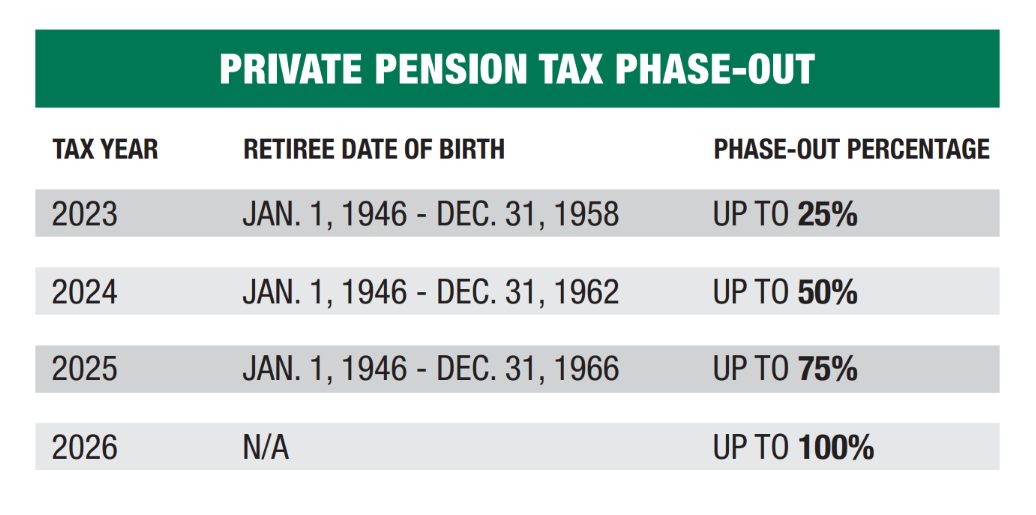
Dear Neighbor,
It continues to be an honor serving you in the State Senate. I look forward to all the great things that the people of Genesee County will do together in 2024.
The new year also means tax season is upon us — this year, however, differs a great deal from previous ones as it is the first year Michigan families and seniors can take advantage of historic tax relief passed by Senate Democrats last March.
As you work to file your federal and state income taxes — due by April 15, 2024 — I hope you find the information contained in this newsletter helpful in maximizing your return. Please know my office is available to assist you as you work through this process.
As always, should you ever need assistance communicating with the Treasury department or any other state agency throughout the year, please do not hesitate to reach out to me and my office — we are here to serve you. You can contact me toll-free at (855) 347-8027, by email at SenJCherry@senate.michigan.gov or through my website online at SenatorCherry.com.
Returning More Money to Taxpayers to Help Combat Inflation
Rising costs, high fuel prices and supply chain issues are making it harder for families to put food on the table and fill up their gas tank. To help change this reality, last March, Senate Democrats finalized the biggest tax relief initiative Michigan has seen in decades. The plan overhauls the unfair and unpopular retirement tax and expands the Working Families Tax Credit, helping more Michigan families and seniors save money.
Expanding the Working Families Tax Credit
To help alleviate financial hardship for families, Senate Democrats created the Working Families Tax Credit — quintupling Michigan’s match of the federal Earned Income Tax Credit (EITC) from 6% to 30%. Public Act 4 of 2023 will help 700,000 Michiganders who have the hardest time affording the basics save an average of $3,150 per year. Based on 2019 data, this expansion will help nearly 26,000 families in District 27 save more than $650 annually on average. The expansion is set to take effect on February 13, 2024. To qualify for the Michigan EITC, you must already qualify for the federal credit.
In addition to claiming it this tax season, the expanded Michigan EITC is also retroactive to the 2022 tax year (last tax season). Federally eligible individuals who claimed the Michigan EITC on their 2022 taxes received the original 6% credit. After the expansion takes effect, the Michigan Department of Treasury will begin to issue supplemental check payments over a period of 5-6 weeks, to provide eligible taxpayers with the remaining 24% portion of the credit. The Michigan Department of Treasury encourages residents to stay up to date and verify their eligibility at Michigan.gov/taxes.
VERIFY YOUR TAX CREDIT ELIGIBILITY
The Michigan Department of Treasury encourages residents to stay up to date and verify their eligibility by visiting Michigan.gov/taxes.
Repealing the Retirement Tax
Ending the tax on retirees has been a top priority for Democrats for more than a decade. Public Act 4 of 2023 phases out the unfair and unpopular retirement tax over four years and will put an average of $1,000 back in the pockets of 500,000 households. This legislation provides targeted and equitable relief for retirees, restoring the broken promise of a safe, secure and happy retirement for Michiganders.
Public police officers and firefighters, county correction officers, state troopers and sergeants will receive the full exemption beginning on February 13, 2024. Michiganders from other professions will have the option to choose the best taxing situation for their retirement benefits, by opting into either the tier structure subtraction or phase-in subtraction until the full repeal takes effect in 2026. You may wish to consult with a qualified tax preparer to ensure you are able to deduct the maximum amount of retirement benefits. For more information, visit Michigan.gov/taxes.


Tax season is here, so it’s time to get out your tax documents and file with the state and federal governments before the
national deadline on Monday, April 15, 2024. Here are tips on how to take advantage of some of the most common tax
deductions while staying clear of common scams that target people during the early parts of the year.
For federal tax information and returns and to learn additional ways to protect yourself from tax scams, the IRS’ official
website is IRS.gov. One easy tip is that the IRS will only reach out to you through regular mail delivered by the U.S. Postal
Service. The Michigan Department of Treasury’s official website is Michigan.gov/treasury. They also have a dedicated tax
page at Michigan.gov/taxes.
Charitable Contributions
In most cases, you can claim the full amount you give to an IRS-qualified organization as an itemized deduction on your federal taxes. Since 2012, however, credits for certain donations are no longer available on your Michigan tax return.
Be sure to check with IRS.gov or your tax preparer, if applicable.
Home Ownership
Costs such as property taxes and points paid to get a lower home loan interest rate are deductible, as is interest on home equity loans up to a certain threshold. Your deduction is generally limited if all mortgages used to buy, construct or improve your first home (and second home, if applicable) total up to $750,000. Mortgages that existed before December 14, 2017, will continue to receive the same tax treatment as under the old rules.
Medical Expenses and Other Deductions
Medical costs — including costs associated with preventative care, surgeries, dental, vision, psychologist visits, hearing aids and more — that exceed 7.5% of your federal adjusted gross income may be claimed on your taxes. Be sure to include them as itemized deductions. You may also qualify for deductions from student loan interest, child and dependent care, mortgage interest and more.
To learn more details, visit IRS.gov/credits-deductions.
Small Business Expenses
Generally, most types of business insurance, the cost of utilities, rent payments, expenses related to the purchase and upkeep of company-owned vehicles, office supplies and furniture are all tax deductible.
Visit IRS.gov/credits-deductions/businesses for more details.
Veterans and Their Families
Nearly 568,000 veterans call Michigan home. So many put their life on the line — sacrificing their comfort and safety — to defend our ideals of liberty and democracy. After their service to our state and nation, it’s our responsibility to ensure they have the benefits they deserve. A 2023 reform requires a property tax exemption on real property used and owned as a homestead by a disabled veteran — or a veteran’s surviving spouse — to remain in effect, until rescinded by the individual granted the exemption or denied by the assessor.
Understand Refund Timing
The IRS processed more than 90 million tax returns last year. Nevertheless, they are very efficient at turning returns and payments around in 21 days for those who file electronically. If you mail in a paper return, the IRS has warned it can take as long as six months or more to process. However you file, you can check the status of your refund through the “Where’s My Refund?” page on the IRS website.
Visit IRS.gov/refunds for more details

Clean Energy Provisions in the Federal Inflation Reduction Act
In August 2022, President Joe Biden signed the federal Inflation Reduction Act into law, which includes nearly two dozen tax provisions designed to save families money on their tax and energy bills, while accelerating the deployment of clean energy, clean vehicles, clean buildings and clean manufacturing. As you file your 2024 taxes, keep deductible items in mind.
Home Clean Electricity Improvements
If you made qualified energy-efficient improvements to your home after Jan. 1, 2023, you may qualify for a tax credit up to $3,200. Some of the qualified improvements include:
- Solar panels for electricity from a local provider.
- Home back-up power battery storage with capacity of 3 kWh or greater.
- Electric or natural gas heat pumps and water heaters; central air conditioners; natural gas, propane or oil water heaters, furnaces or hot water boilers that meet or exceed the specific efficiency tiers established by the Consortium for Energy Efficiency.
- Insulation materials and systems that meet International Energy
Conservation Code standards. - Exterior windows that meet Energy Star’s Most Efficient requirements.
Electric Vehicle Credits
Michiganders who have purchased a new electric vehicle, qualified plug-in EV or fuel cell electric vehicle may qualify for a credit up to $7,500. Please note that eligible vehicles must meet critical mineral and battery component requirements. To qualify, your adjusted gross income either this year or last year must be below the following thresholds to qualify: $300,000 for married couples filing jointly, $225,000 for heads of households or $150,000 for all other filers. For an interactive guide to energy credits available under the Inflation Reduction Act, visit cleanenergy.gov.

Federal Assistance With Tax Preparation
The Internal Revenue Service (IRS) has a Free File Program, which lets qualified taxpayers prepare and file federal income tax returns online using tax preparation software. It’s safe, easy and no cost to you. It provides two ways to prepare and file your federal income tax online for free:
Guided Tax Preparation
The guided option provides free online tax preparation and filing at an IRS partner site. Their partners deliver this service at no cost to qualifying taxpayers. Taxpayers whose adjusted gross income (AGI) is $73,000 or less qualify for a free federal tax return.
Free File Fillable Forms
Those whose gross income is greater than $73,000 can take advantage of Free File Fillable Forms — electronic federal tax forms, equivalent to a paper 1040 form. You can learn how to prepare your own tax return using form instructions and IRS publications if needed.
Local Assistance With Tax Preparation
MI Free Tax Help
Eligible Michigan residents across the state can connect with a free tax preparation expert who can help you claim all the tax credits available, at no cost to you, ever. Simply call 2-1-1 on any phone or visit MichiganFreeTaxHelp.org. The website is powered by the Community Economic Development Association of Michigan and the Michigan Economic Impact Coalition. These organizations are committed to improving access to free, high-quality income tax preparation assistance and promoting personal financial stability and asset-building
MiABLE Savings Account
The MiABLE Disability Savings Program was created to allow individuals with disabilities and their families to save funds for Qualified Disability Expenses that support health, independence and quality of life without jeopardizing eligibility for necessary federal benefits. An individual is eligible if they became disabled or blind before the age of 26, and either is currently entitled to Social Security Disability Insurance (SSDI) or Supplemental Security Income (SSI) or gets a disability certification under rules the U.S. Treasury will write. For more information or to set up your account, visit miable.org.
